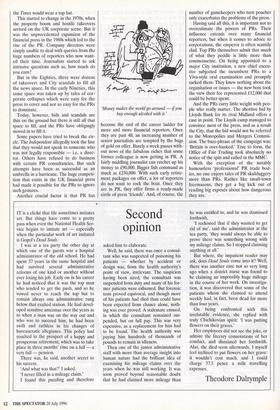Second opinion
IT is a cliche that life sometimes imitates art. But things have come to a pretty pass when even the National Health Ser- vice begins to imitate art — especially when the particular work of art imitated is Gogol's Dead Souls.
I was at a tea party the other day at which one of the guests was a hospital administrator of the old school. He had spent 37 years in the same hospital and had survived several administrative reforms of one kind or another without ever losing his job. Early on in his career he had noticed that it was the top man who tended to get the push, and so he vowed never to reach the top but to remain always one administrative rung below that exalted station. He had devel- oped sensitive antennae over the years as to when a man was on the way out and who was to succeed him; he had been swift and ruthless in his changes of bureaucratic allegiance. This policy had resulted in the prospect of a happy and prosperous retirement, which was to take Place in three months' time on a full — a very full — pension.
There was, he said, another secret to his success.
'And what was that?' I asked.
'I never filled in a mileage claim.'
I found this puzzling and therefore asked him to elaborate.
Well, he said, there was once a consul- tant who was suspected of poisoning his patients — whether by accident or design was, from the health authority's point of view, irrelevant. The suspicion having been aired, the consultant was suspended from duty and many of his for- mer patients were exhumed. But forensic tests proved equivocal, and though more of his patients had died than could have been expected from chance alone, noth- ing was ever proved. A stalemate ensued, in which the consultant remained sus- pended, but on full pay. This was very expensive, as a replacement for him had to be found. The health authority was paying him hundreds of thousands of pounds to remain in idleness.
Then one of the junior administrative staff with more than average insight into human nature had the brilliant idea of examining his mileage claims over the years when he was still working. It was soon proved beyond reasonable doubt that he had claimed more mileage than he was entitled to, and he was dismissed forthwith.
'I reckoned that if they wanted to get rid of me', said the administrator at the tea party, 'they would always be able to prove there was something wrong with my mileage claims. So I stopped claiming anything at all.'
But where, the impatient reader may ask, does Dead Souls come into it? Well, there was another case not so very long ago when a district nurse was found to be claiming an impossibly huge mileage in the course of her work. On investiga- tion, it was discovered that some of the patients whom she claimed to attend weekly had, in fact, been dead for more than four years.
On being confronted with this irrefutable evidence, she replied with truly Chichikovian spirit: 'I was putting flowers on their graves.'
Her employees did not see the joke, or admire the literary connotations of her conduct, and dismissed her forthwith. Alas, she died soon afterwards. I myself feel inclined to put flowers on her grave: it wouldn't cost much, and I could charge 37.5 pence a mile travelling expenses.
Theodore Dalrymple


























































 Previous page
Previous page